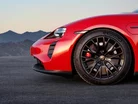Porsche partner Customcells catalyses EV Development Centre

The German automotive company, Porsche has taken on a joint venture in the EV production space, with battery producer, Customcells. Porsche has a larger stake in the project, which involves the development of a new site for the production of batteries.
The new facility, which will be based in Tübingen, Germany, will provide a key component for Porsche’s EV vehicle innovations and has the potential to supply other German-owned automotive companies. The project gratefully receives funding of around €60mn (£51.5mn), provided by the German government and the state of Baden-Württemberg.
Thanks to the government funding, and the significant capital investment from Porsche, the venture will provide opportunities for 13 engineers upon opening the Weissach Development Centre. As the industry evolves and the demand increases, the companies will aim to have around 80 engineers working on EV battery production by 2025.
Porsche Embraces the Switch to EV
The development of the new site is a result of Porsche’s sustainability strategy. Porsche has published statements on its website, which discusses the importance of Environmental, Social, and Governance (ESG) practices. Like many other companies in the sector, Porsche is committed to a sustainable future, both for the environment and its employees.
The company’s ‘Employees & Society’ publication talks about its management approach to support its staff development and workplace culture, as well as expressing its consciousness of environmental issues detailing its efforts to support a renewable energy future.
Sustainable Automotive Development
The collaboration between Porsche and Customcells will not only provide jobs for the industry but will also push the industry further. The initial battery production run will be limited to a maximum annual capacity of 100MWh, which Porsche claims is enough to power 1000 EVs.
"The first task is to get a significant advantage in volumetric energy density, as well as high-temperature sustainability," said Michael Steiner, Research and Development at Porsche, later adding that "if we see a potential to come down with [the] cost of cells, there might be a chance for higher volume, but this is not the task I gave the team." The company will focus primarily on motorsport and the high-performance vehicle market, with opportunities for application in other brands in the Volkswagen Group, such as Bentley, Bugatti, and Lamborghini. "Our plan is for Porsche to be the first customer, but definitely, if this technology is attractive as a high-performance solution, it will be also open for other brands in the Volkswagen Group," says Steiner.
Porsche also holds a large financial stake in Rimac, a Croatian all-electric hypercar producer, which Steiner believes could benefit from the developments that take place at the new research facility. "We are happy to have a stake in Rimac, and they have a lot of know-how and knowledge in electric super-sports cars and batteries. We also have projects that we run together, and if such cell technology will be feasible, why not also have such technology in any other brand in the VW Group or Rimac?"
- VWFS' John Lewis: the Evolution of Driving Through the ErasConnected Car
- Uber Launches AI Assistant to Boost EV Adoption EffortsTechnology
- Parkopedia Provides Enhanced Charging Solutions to BMW GroupTechnology
- How Gotion High-tech is Revolutionising Battery TechnologiesCharging & Infrastructure



